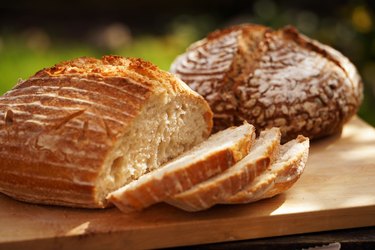
There's nothing worse than craving a slice of toast, only to notice your loaf of bread has some suspicious fuzzy patches. But can moldy bread make you sick, and if so, what are the potential symptoms from eating moldy bread?
Here's everything you need to know about whether moldy bread will make you sick, including if you can get food poisoning from bread that's past its prime.
Video of the Day
Video of the Day
Can You Get Sick From Eating Moldy Bread?
The short answer: Yes, it's possible that eating bread with mold on it can make you ill.
That said, if you accidentally take a bite of moldy bread, you're probably going to be OK, according to the Cleveland Clinic. That's because many types of mold aren't harmful — just be sure to keep an eye out for any unusual symptoms for the rest of the day.
But that's not to say that mold is good for you or that it's safe to eat. Some types of mold that grow on food can be dangerous, per the Cleveland Clinic. For instance, certain molds can trigger an allergic reaction or respiratory problems in some people, according to Michigan State University.
What's more, bread mold can sometimes produce fungal poisons called mycotoxins, which can make you ill, per Michigan State University. Some toxins — like aflatoxins — can even cause death, according to the Cleveland Clinic.
And because there's no way to tell what type of mold you're dealing with just by looking at your loaf, you run the risk of getting an allergic response or food poisoning from bread if you decide to tuck in.
How Long After Eating Moldy Bread Will You Get Sick?
Timing can depend on the type of mold you ate: Some reactions occur right away, whereas others are delayed, per the Cleveland Clinic. In general, though, if you suddenly experience symptoms like shortness of breath, nausea, fever or diarrhea, seek medical attention.
Symptoms From Eating Moldy Bread
The type of mold on bread can vary. As a result, there are a number of reactions you can have after eating spoiled food. Here are the potential symptoms of eating moldy bread, broken down by reaction type:
1. Allergic Reaction
Bread mold can make you sick by triggering an allergic response. According to the Mayo Clinic, symptoms of a mold allergy include:
- Sneezing
- Runny or stuffy nose
- Cough
- Postnasal drip
- Itchy eyes, nose and throat
- Watery eyes
- Dry, scaly skin
Warning
Some people can have an extreme allergic reaction called anaphylaxis, where your throat closes up and makes it difficult to breathe, per the Mayo Clinic. Seek medical care immediately if this happens to you.
2. Respiratory Distress
For others, the results of eating moldy bread can include breathing problems like shortness of breath, per the Cleveland Clinic.
Mold allergies can also trigger asthma attacks in some people, according to the Mayo Clinic. This can lead to symptoms such as:
- Coughing
- Wheezing
- Shortness of breath
- Chest tightness
3. Food Poisoning
It's also possible to get food poisoning from moldy bread, according to the Cleveland Clinic. This may be due to the mold's toxins or as the result of eating mold-adjacent bacteria that cause foodborne illness.
Per the Mayo Clinic, symptoms of food poisoning include:
- Nausea
- Vomiting
- Watery or bloody diarrhea
- Abdominal pain and cramps
- Fever
- Dehydration
- Headache from dehydration
Tip
See a doctor if you have blood in your vomit or stool, diarrhea that lasts for more than three days, a fever higher than 100.4 degrees Fahrenheit, dehydration or neurological symptoms, including tingling or blurry vision, per the Mayo Clinic.
How to Avoid the Effects of Eating Moldy Bread
Though you may be tempted to cut off the moldy part and chow down on the rest of the slice, resist the urge. Mold is more than meets the eye: Moist or spoiling food can also contain invisible bacteria that could also make you sick, according to the Cleveland Clinic.
So instead of eating moldy food, ditch the spoiled bread and hold off on that toast or sandwich until you have a fresh loaf handy.
Fresh bread should be stored in the pantry or other cool, dry area for three to five days, according to the New Mexico State University, College of Agricultural, Consumer and Environmental Sciences. Once it's opened, store it in an airtight container.
If you freeze your bread, it can last for two to three months. However, homemade bread might not last as long because it doesn't contain the preservatives found in commercially prepared breads that extend their shelf-life.
- Cleveland Clinic: "What Happens if You Accidentally Eat Moldy Food?"
- Mayo Clinic: "Food poisoning"
- Michigan State University: "Other Decomposers Reading: Bread Mold"
- New Mexico State University, College of Agricultural, Consumer and Environmental Sciences: "Food & Nutrition"
- Mayo Clinic: "Mold allergy"
- Mayo Clinic: "Food allergy"
Is this an emergency? If you are experiencing serious medical symptoms, please see the National Library of Medicine’s list of signs you need emergency medical attention or call 911.